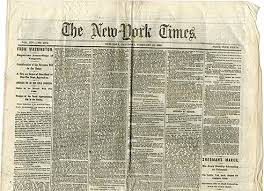AP Euro Survival Guide

May 26, 2023
Taking AP European history is something you won’t regret. Although it has its ups and downs, so does everything else in life, so trust me when I say you should take a chance on it. It never hurts to try, and it never hurts to challenge yourself, which is what AP Euro is all about; growth.
My name is Juliette Damian, and this is my AP European History Survival Guide. First, I would describe myself as a hard worker, not a genius. When I was in your shoes, contemplating whether or not to take AP Euro, I was told that only intellectuals were able to survive this class and that it was nearly impossible to do well in, and I am sure people are telling you the same exact thing. I’ve always been a good student, but it didn’t always come naturally, I was able to obtain A’s throughout my life, mostly because I put in the effort, and set my priorities straight. During my time in AP Euro, I was actively a part of the Varsity Tennis Team at Santiago, I had games and practices every day after school, was an officer of the Girl Up club at our campus, and often wrote articles for the school newspaper all throughout the year. I was signed up for all honors classes with a set of strict teachers, yet I still managed to survive AP European History, and so can you.
Suggestions/Tips
No matter if you have too much on your plate or just enough, here are some helpful tips to survive your long yet enlightening journey in your AP Euro class.
First off, you will need to take a lot of notes — if that is from youtube videos, the textbook, study books, or her lectures — do not skip or pretend to take notes unless you have a photographic memory, which is very unlikely. When taking notes, do not write too much or too little; not every detail counts, but the main ideas do. In your textbook, there are focus questions that would be helpful to write down the question and the answer to; it will help to make connections, answer causation and continuation questions, and overall summarize the section in the chapter. Trust me, details may be helpful as evidence in your essays, but main ideas can be even more critical, and even help you pave the way to remembering the smaller events.
Most assignments will always be due the day before a practice test, so make sure to use your time wisely, and do not procrastinate. One of my biggest mistakes was not looking over an assignment posted when I was absent, leaving it last minute, and not being able to turn it in; the next day, getting a 2/7 on my practice DBQ and not being able to make it up because that assignment was not turned in on time. You will usually have the project posted a week earlier, so there is no excuse; look over the assignments the day before it is due and make sure you have completed each one, especially on the days you were absent. Most assignments, like HAPPY’s or charts, are made to be finished in class; the only notetaking is homework most of the time, so don’t slack off in class and get everything done there rather than taking extra time away from your schedule at home to complete it. Just beware, if your assignments are not in, and you have a B- or lower than you will be ineligible to partake in test corrections for that chapter.
Now that we know turning in your assignments affects whether you can make up your practice tests, what are test corrections? Test corrections are given to students to make up for missing points on their practice tests; take advantage of this! You can earn up to 100% if you correct your mistakes or complete your essay during the time she gives you, usually up to three days. I recommend completing your test corrections the first or second day you are given the opportunity, so she can have enough time to send you feedback, and you can re-edit and earn up to as many points as possible. Treat the practice tests as if they are real ones, take advantage of them, learn from them, and improve from them to feel more confident during the real tests.
Speaking of confidence, stressing out too much will only hurt you when approaching the actual test days. From my experience, I am a terrible test taker, and my mind would still go blank during the test, although the information was fresh in my mind just a second ago. I’ve come to realize that my performance drops during real tests, and my brain becomes foggier than it is during the practice tests due to the pressure and stress I put on myself, and I am sure many of you can relate –but please — don’t stress yourself out more than you should. I do not regret taking AP Euro, but I do regret the stress that I put on myself because, in the end, this class taught me essential history and skills and taught me that a grade is not worth everything. This class has taught me to value learning because I want to, not because I need to or because I have to retain a particular grade or GPA — I wished I had spent the year studying peacefully rather than stressfully and knowing that if I made mistakes, that I would learn from them, and if I did not get the grade that I wanted, I at least grew to become a better educated and worldly person. So when taking tests, ask yourself what matters most to you– improving yourself or improving a letter and a number? Remember, confidence needs to be worked on just as much as test-taking, skills, and memorization — it comes as a package.
If you are also a bad test taker, I recommend practicing test questions independently from study books (such as the Princeton Review) and checking in with Mrs. Krueger often to ensure you checked off all your points. Don’t be afraid to ask questions; she is there to help and not judge you. Practicing the skills and structure of the essays/responses is just as important as learning the history; I recommend checking her “Files” section at the beginning of the year to review these criteria so you can feel more ready than ever. If you struggle with writing within a specific time limit, like myself, then that is something you should focus on practicing– writing faster– there is no “fluff” in AP Euro. There are no grammar or spelling checks either; as long as you have the information and get it done, you should be doing well in the class. Overthinking or overcomplicating is the worst enemy of time, so avoid it.
When studying for any AP Euro test, need that be the SAQ, DBQ, LEQ, or MC, try to study the topic for about 15 minutes a day, even if you are too lazy too; it is better than studying for hours before the test and burning yourself out. Information is harder to be retained when cramming or stuffing it into your brain the day before, so use your time wisely; you’ll be able to rest more when you realize that you already have studied enough because of those 15 minutes a day– it will feel like you haven’t even studied but somehow you know all the information already! Trust me, I burnt myself out because, by the time I finished my homework and studying for my other classes, I did not feel like studying 15 more minutes of Euro at the end of the day, so I left it for the day before the test, where I sat in my room for hours trying to understand the history, ultimately making it worse for myself than it would have been if I just made time for those 15 minutes. So, don’t make it harder on yourself.
When taking the SAQ, using TEA– Thesis, Evidence, and Analysis– is recommended to score well, but SAQs must be very specific and hold correct information. Make sure to connect your evidence back to the prompt in your analysis. For the LEQ and DBQs, outline for at least 5 minutes or more and use T2P2– Topic, Timeframe, Purpose, Position (Your argument) in your introduction. Mrs. Krueger will give you more structure advice, but make sure you are confident using those structures before taking your tests. During the DBQ, make a stance, brainstorm supporting evidence to back your argument up, categorize your documents, take notes, and draft your HAPP’s. On the multiple-choice, a question per minute may seem difficult at first, but you will end up adapting to it with practice; try reading the date and authors name of the passage first and identify what may be going on during that period, I also recommend reading the question before reading the passage so you can avoid rereading the entire document and wasting time. Lastly, read the multiple-choice questions and determine which ones should be eliminated, helping you find the correct answer. Best of luck!
The end-of-year AP test seems far, far away, but it will approach you quicker than you think, so don’t procrastinate. When nearing the AP test, give yourself enough time to study comfortably so you can retain information and master the material. Use every resource you can– the textbook, study books, your own notes, youtube videos, google– because when entering the AP test, it will feel like you just couldn’t have studied enough. On the other hand, if you know the structure, know enough of the information, and manage your time well, you can just about ace everything handed to you. At the end of the year, I recommend reviewing each chapter’s essential questions and testing if you can answer them easily; if not, I found that using AI helps answer specifics and make connections. If you are adequately prepared, there’s a 99.9% chance you will do extraordinary on the AP exam.
Now, this may seem like hard work, and it is, but you will learn more about yourself in the process, and you will challenge yourself and grow from the experience; which is not something that every class can promise you. As someone who is a slower learner, got home every day at around 6 pm-7 pm from practice, had to sleep by 10 pm, and often did not have free study time at school; I managed to pass AP Euro with a B. You can do even better with the proper preparation and determination. Take a chance on AP Euro, and take a chance on your abilities; anyone can do well in this class with the right mindset. I hope this helped, and good luck on your journey through history.











